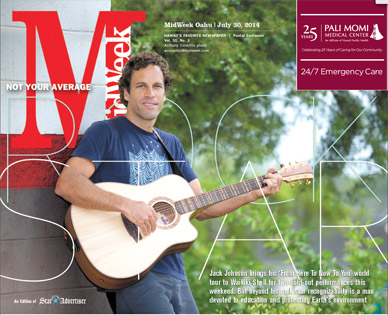Not Your Average Rock Star
Wearing shorts and a blue T-shirt, Jack Johnson walks in slippers to a lone microphone equipped with a single guitar.
Today’s venue is a covered basketball court at Mililani Ike Elementary School for an audience of students and staff — a stark contrast to the huge, crowded concerts Johnson has become accustomed to playing.
20140714_Pistoia_Italy_KJ - 15
It isn’t every day a Grammy-nominated musician will provide this sort of entertainment. But for all of Johnson’s accolades, at his core remains a man who has been entirely unaffected by fame.
His foray into music, he says, always was just a hobby — a background to what he was hoping to pursue. Had he not found a career in music, Johnson — born and raised in Hawaii — might be spending his time creating nature documentaries.
Having played ukulele in school, a 14-year-old Johnson picked up a guitar and began learning chords.
In college at University of California at Santa Barbara, he studied film. After, he began making surf movies. At the insistence of friends, he slowly began incorporating his music into films, developing a small fan base among surfers.
After meeting and playing with musicians Garrett Dutton of G Love & Special Sauce and Ben Harper, Johnson’s following grew.
On a trip to Australia to play at a music festival, a country he had visited before to work on surf movies, Johnson found himself stumped at how to fill out a form that required his occupation. Eventually, he brought himself to write in “musician.”
“It felt so weird. I think I, like, erased it and wrote it down again,” he recalls with a laugh. “I always think back to that moment as like, ‘OK, is this really happening?'”
From the beginning of his career, Johnson has made it a point to involve himself with community initiatives. In 2003, he and wife Kim founded Kokua Hawaii Foundation, which seeks to enhance environmental educational opportunities in schools and the community in Hawaii. The next year, Johnson hosted the first Kokua Festival.
“We’re making a great living from the record sales, and so we just thought it was a nice balance to be able to do it and have a nonprofit aspect of what we do,” he says.
The festival, which last took place in 2010, brought together various musicians and artists to raise funds for Kokua Hawaii Foundation. Past participating musicians have included local singers such as Henry Kapono and Amy Hanaiali’i Gilliom, as well as others like Eddie Vedder and Ziggy Marley.
Eventually, his memories of the first festival would drastically alter Johnson’s touring style.
After his fourth album Sleep Through the Static was released in 2008, Johnson was feeling uncertain.
“It just kept growing so much bigger than I thought it was going to be … I just didn’t know if I wanted to keep going out and touring on the level that we were,” he says.
It was then that he and Kim made the decision to donate 100 percent of the proceeds from touring to establish the Johnson Ohana Charitable Foundation. Like Kokua Hawaii Foundation, the endowment seeks to provide education on environmental sustainability, but in communities throughout the world.
To generate awareness for non-profit organizations that work in sustainable agriculture, plastic-free initiatives and others, each concert features an All At Once Village Green. Here, about 10 organizations that partner with the foundation are featured, specific to each concert location.
“All those people coming together — I mean, it’s something,” he says. “When you have that many people singing along, and then when all those people know that the energy they’re bringing actually is going back to their own town, doing positive things there, it makes the live experience so much better.”
“We partner with those groups and give part of the proceeds from the show,” adds Kim. “We do matching grants and we try to give them attention through our radio partnerships on the show.”
Johnson himself also implements sustainable touring methods, using biodiesel for touring buses and asking caterers to source food locally. Those who attend his concerts also are encouraged to bring a reusable water bottle to refill at stations set up at shows.
“That may sound like a small thing, but it’s one of the important things for me,” he says, adding that growing up in Hawaii, he often would see plastic, bottle caps and other waste on the beach while surfing.
“If you define the environment as everything around us, you know, including ourselves, then really it’s just another word for everything, and so it’s really just finding a balance in the world we’re in.”
Johnson’s free concert for Mililani Ike was to reward its success as one of the top schools to collect plastic bottle caps, a recycling initiative with Kokua Hawaii Foundation. Kim later explains that the bottle caps collected will go to Method cleaning products, which will recycle the caps for its Ocean Plastic Hand and Dish Soap, available exclusively at Whole Foods Market. It’s only one of a number of programs Kokua Hawaii Foundation offers to schools and communities throughout the state.
The Johnsons founded the program in part because Kim left her job as a high school teacher to become Jack’s tour manager.







